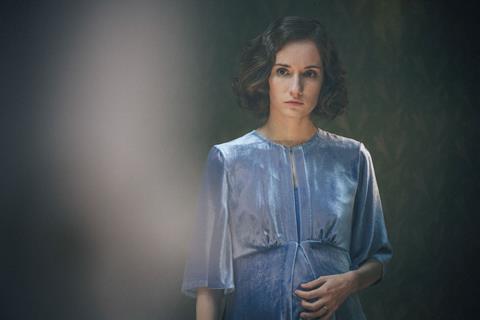Period Czech drama set at the dawn of the Second World War has a decidedly modern sensibility

Dir: Matej Chlupacek. Czech Republic. 2023. 117mins.
It’s 1937 in the First Czechoslovak Republic and, blithely unaware of the war that is just over the horizon, Helena (Eliska Krenkova) and her husband Alois (Miroslav Konig) have never had it so good. He is the head of a booming factory in the verdant countryside, producing products including artificial silk; she is about to have their first child. This is the idyllic setting for Czech director Matej Chlupacek’s second feature which, while playing by the rules to some extent, refuses to be constrained by anything quite so demure as the words ‘costume drama’. His framing choices are largely handheld and energetic; the attitude of screenwriter Miro Sifra, bracing. The resulting film soon blooms into a character study, marital drama and a detective mystery, of sorts, while also scrutinising attitudes and arguments that persevere today.
Refuses to be constrained by anything quite so demure as the words ‘costume drama’
Released domestically last month and sold through Level K, the film now plays in Thessaloniki’s Meet The Neighbours strand. Its handsome period detailing, coupled with its dissection of gender politics that are far from confined to the past, should see it continue around the festival circuit while it may also easily appeal to arthouse distributors further afield.
Despite its historical setting, Chlupacek and Sifra have one eye on the present day. The direction of their gaze is clear from the film’s opening moments when Helena breaks the fourth wall by looking straight at us. The camera then cuts to an upside down shot which slowly turns the right way around – another none-too-subtle indication that Chlupacek would like us to adjust our view.
Helena is at a posh dinner for a company bigwig and her waters are about to break. As they do, we travel back in time to five days previously. Bold intertitles announce twin expectations: it is five days ’until Helena gives birth’ and four ’until the boss arrives’. What nobody expects is that the dead body of an intersex baby will be found dumped at the factory site in the intervening window.
The discovery sets the factory rumour mill in motion. This, in turn, leads Alois and the management to believe it was a deliberate act of sabotage aimed at souring the company in the eyes of locals just as it is on the brink of expansion. But even as he is bringing shady looking counterintelligence agents Robert (Milan Ondrik) and Major (Marian Mitas) into their home, Helena, who has a nursing background and aspires to be a doctor, is forming her own conclusions. She believes the baby has been born to someone who may be intersex themselves, and so begins a hunt. Although she readily tells Alois about her suspicions, her course of action begins to cause friction between them.
The curiosity Helena has about the dead infant, stemming at least partially from fears about her own unborn child, also leads her to read what literature she can about being intersex. Here, Chlupacek catapults us into her imagination, as images of flowers such as peace lilies, whose appearance echoes genitalia, spring into animated life. This simplification is something that will go on to be challenged by a narrative that shows gender is as much defined by what is going on within a person as it is by visible differences.
Despite Helena being self-possessed and keen not to have herself defined by being a woman – or, worse, being pregnant – she still fails initially to realise that self-definition is everyone’s fundamental right. Thus her flawed heroine, with her permanent blue sky outfits, impeccably designed by Jarmila Dunderova, becomes a conduit for the audience as she is forced to do some blue sky thinking of her own. Krenkova manages her character’s complexity well, letting her flaws and her assets dominate depending on the moment, while Richard Langdon offers subtle and soulful support as a factory worker who can teach Helena a thing or two about considering another viewpoint.
Martin Douba’s handheld camerawork adds an energetic intensity to many of the scenes and Richard Goff’s scoring holds surprises, including a sudden percussive outburst that brings unexpected muscle to a key scene. Beyond the story itself, the historic setting, ahead of the rise of Hitler – who is dismissed here by a character in a brief aside – acts as a constant and powerful reminder that none of us knows what the future will bring, so perhaps we should work on improving the present instead.
Production companies: Barletta
International sales: Level K tine.klint@levelk.dk
Producers: Maja Hamplova, Matej Chlupacek
Screenplay: Miro Sifra
Cinematography: Martin Douba
Production design: Henrich Boráros
Editing: Pavel Hrdlicka
Music: Simon Goff
Main cast: Eliska Krenkova, Miloslav Konig, Milan Ondrik, Richard Langdon, Martha Issova, Lubos Vesely, Ladislav Hampl, Marian Mitas
























